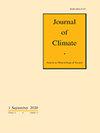南大洋经向涡热输送的十年趋势
IF 4
2区 地球科学
Q1 METEOROLOGY & ATMOSPHERIC SCIENCES
引用次数: 0
摘要
摘要 大洋中尺度漩涡(EHT)诱导的经向热输送在南大洋(SO)热预算中起着重要作用,但EHT的十年趋势及其相关机制仍不清楚。本文结合 1993-2016 年间 24 年的同期卫星观测数据和《海洋环流与气候估算》第二阶段(ECCO2)再分析数据,对这一科学问题进行了研究。结果表明,卫星和 ECCO2 数据的表层 EHT 在南极海洋,尤其是在南极环极流(ACC)纬度带持续呈现十年极地上升趋势。就南极环极流纬度带的平均值而言,ECCO2 导出的上 1000 米 EHT 线性趋势为每十年 1.1×10-2 PW 或每十年 16%,而其时间均值为 0.07 PW。基于 "混合长度 "理论的诊断分析表明,涡旋动能(EKE)的十年增强是 SO 中 EHT 增加的主要机制。通过能量收支分析,我们进一步发现,涡旋动能的十年增强主要是由于大尺度环流的气压不稳定性增强,将更多的可用势能转化为涡旋动能。对于南部环流中增强的气压不稳定性,可归因于 1993-2016 年间与南环流模式正相位相对应的大尺度风应力对大尺度环流做功的增加。本文确定的 EHT 十年变化趋势可能有助于理解南部海域热储量和海冰范围的十年变化。本文章由计算机程序翻译,如有差异,请以英文原文为准。
Decadal trends in the Southern Ocean meridional eddy heat transport
Abstract Meridional heat transport induced by oceanic mesoscale eddies (EHT) plays a significant role in the heat budget of Southern Ocean (SO) but the decadal trends in EHT and its associated mechanisms are still obscure. Here, this scientific issue is investigated by combining concurrent satellite observations and Estimating the Circulation and Climate of the Ocean, Phase II (ECCO2) reanalysis data over the 24 years between 1993–2016. The results reveal that the surface EHT from both satellite and ECCO2 data consistently show decadal poleward increasing trends in the SO, particularly in the latitude band of Antarctic Circumpolar Current (ACC). In terms of average in the ACC band, the ECCO2-derived EHT over the upper 1000 m has a linear trend of 1.1×10−2 PW per decade or 16% per decade compared with its time-mean value of 0.07 PW. Diagnostic analysis based on “mixing length” theory suggests that the decadal strengthening eddy kinetic energy (EKE) is the dominant mechanism for the increase of EHT in the SO. By performing energy budget analysis, we further find that the decadal increase of EKE is mainly caused by the strengthened baroclinic instability of large-scale circulation that converts more available potential energy to EKE. For the strengthened baroclinic instability in the SO, it is attributed to the increasing large-scale wind stress work on the large-scale circulation corresponding to the positive phase of Southern Annular Mode between 1993–2016. The decadal trends in EHT identified here may help understand decadal variations of heat storage and sea-ice extent in the SO.
求助全文
通过发布文献求助,成功后即可免费获取论文全文。
去求助
来源期刊

Journal of Climate
地学-气象与大气科学
CiteScore
9.30
自引率
14.30%
发文量
490
审稿时长
7.5 months
期刊介绍:
The Journal of Climate (JCLI) (ISSN: 0894-8755; eISSN: 1520-0442) publishes research that advances basic understanding of the dynamics and physics of the climate system on large spatial scales, including variability of the atmosphere, oceans, land surface, and cryosphere; past, present, and projected future changes in the climate system; and climate simulation and prediction.
 求助内容:
求助内容: 应助结果提醒方式:
应助结果提醒方式:


